It’s safe to say that pets have become the new “kids” for many of us. And while van life with a cat is on the rise, the pet that still holds the #1 spot as a van life companion is: the dog!
The thought of starting a life-changing adventure like van life without your four-legged best friend…just feels wrong. But van life with dogs pose a whole slew of new challenges.
How do you keep a dog safe? What if you have to leave the van unattended? How do you handle the dog hair in such a small space? Are national parks dog friendly? How do you keep a dog cool? What about muddy paws? The list goes on…
That’s why I had a Q&A with one vanlife couple who has experienced it all–in their words, they went from “Senior dog van life, to no dog, and now to puppy van life”. They share their own experience and best tips for helping other pet owners make the leap to van life with a dog. Let’s dive in!
Meet KJ and James of Stoke Loaf Van and Their Pup, Hoagie
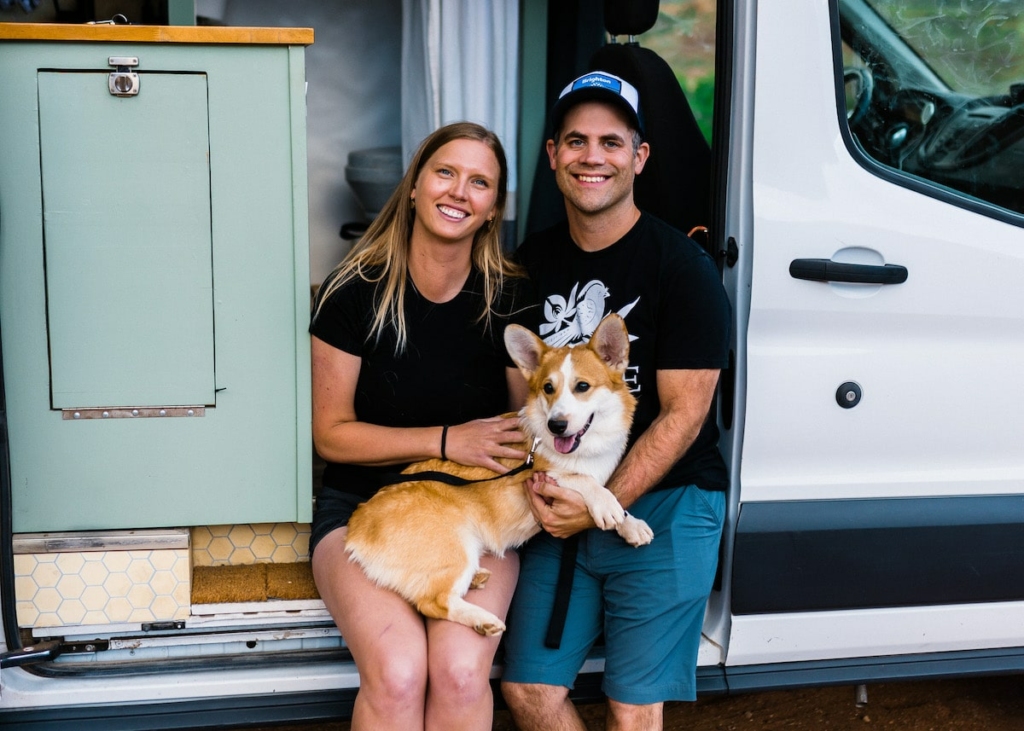
Can you give us a quick intro to yourselves and your van life experience?
We’re KJ and James of Stoke Loaf Van! We lived in our van full time for 2.5 years from February 2020 until October 2022. Our home on wheels was a 2015 Ford Transit, tall roof and extended model. We built it out ourselves over the course of 9 months.
We started life on the road with our dog Lucky, who was a corgi-white German shepherd mix. She passed away in September 2021 and then we spent our last year on the road dog-less… We picked up our current furry friend, Hoagie, on Halloween in 2022. While we haven’t lived full time in our van with Hoagie yet, we have spent about a month and a half cumulatively in the van with him.
First, we are so sorry for your loss of Lucky. Tell us more about going from senior dog life, to traveling without a dog, to puppy van life
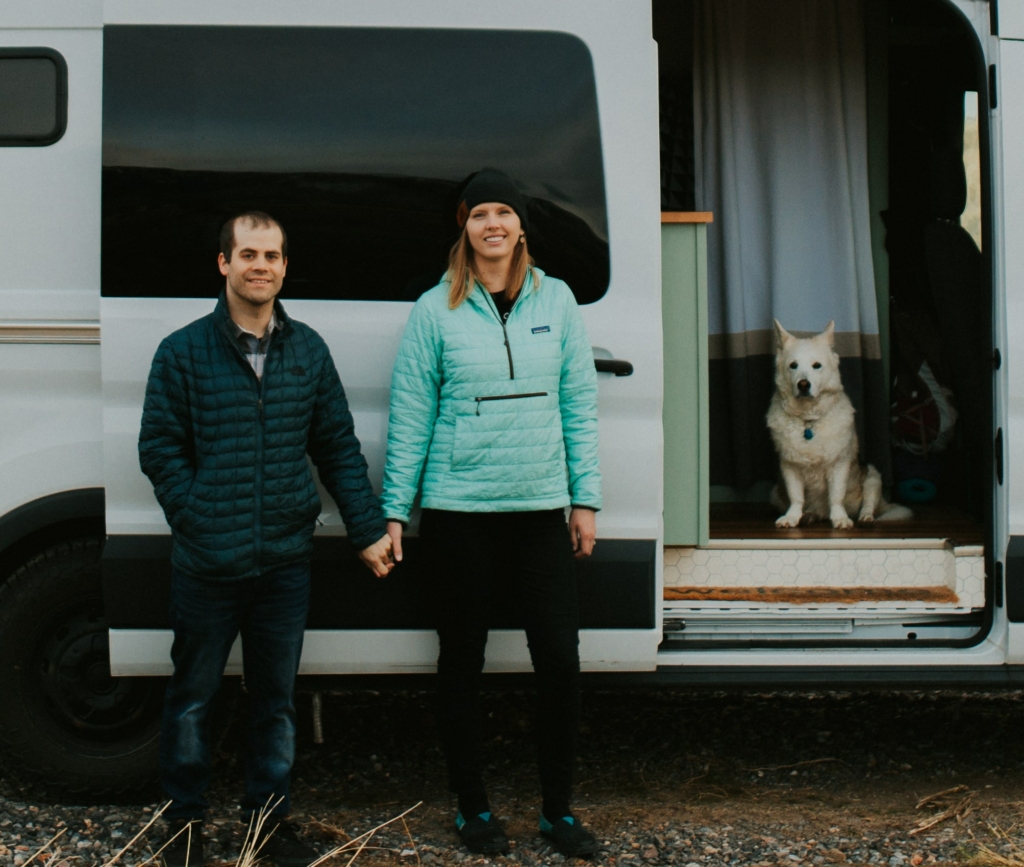
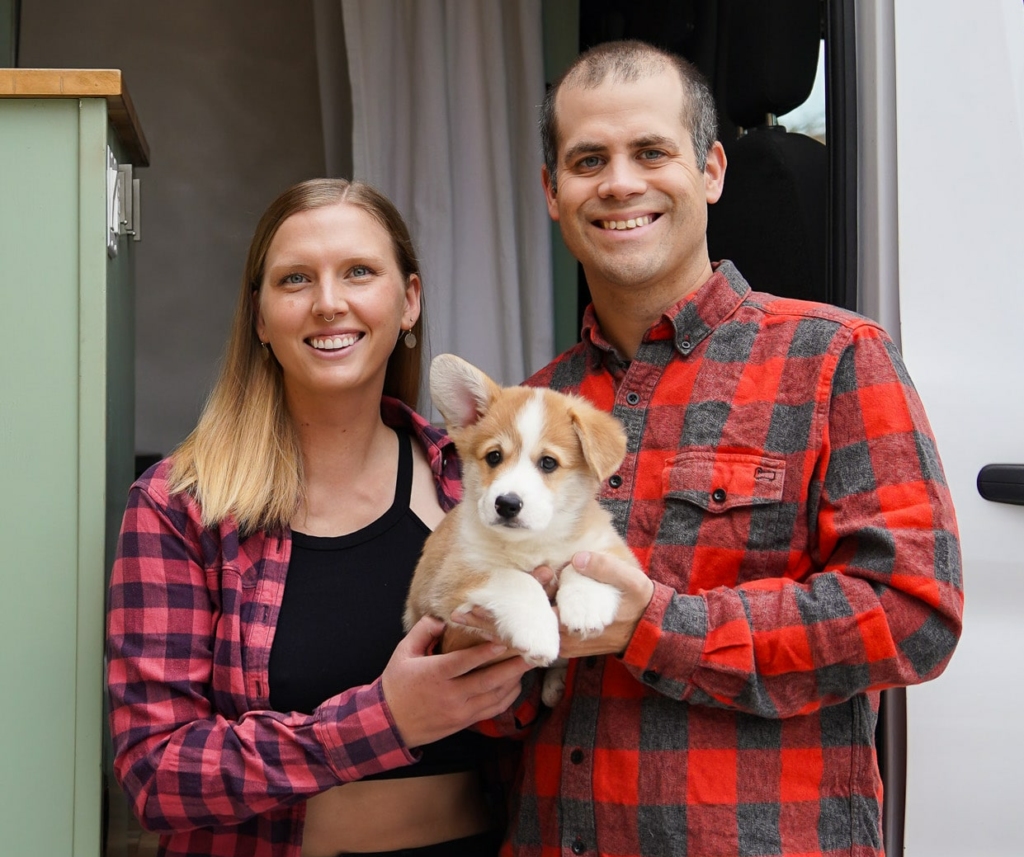
Our previous dog, Lucky, passed away while we were on the road in September 2021. It was a really tough loss and we knew we wanted to get another dog, but also wanted to wait awhile to do van life without a dog for a bit and do a little international travel.
We have always had rescue dogs but ultimately decided to get a corgi, largely influenced by Lucky who was a corgi white German Shepard mix and we really loved the corgi personality traits she displayed.
We have had dogs our entire marriage, almost 12 years, and I, KJ, have had a dog since I was 10 so being without one for a year was really strange. We love that they need us and encourage us to get out for more walks. They really elevate the mood and its so hard to be upset when you have a dog next to you who thinks everything in the world is awesome.
Did living in a van factor into what type of dog breed you decided to get (i.e. dog size, shedding, behavior)?
Behavior and personality were our most important considerations. The personality of our late Senior corgi, Lucky, fit wonderfully with van life and let us know what traits did well and which traits we wanted more of.
We wanted a dog that was confident, quiet, decently active and not overly affected by temperature (hot or cold) so this eliminated really thick-coated dogs and brachial breeds (pugs, Frenchies, things like that because they have a harder time regulating temps).
We also took into consideration which breeds we could travel with easily (to an extent) so that if we needed to board them or fly with them we could do so. In the back of our minds we also kept a note that if we end up back in an apartment they often, unfortunately, restrict certain breeds.
A dog is a long term commitment it’s important to consider what you want to do in your life for the next 10 years when thinking about what type of dog to get.
What are the extra challenges of traveling with a pet dog?
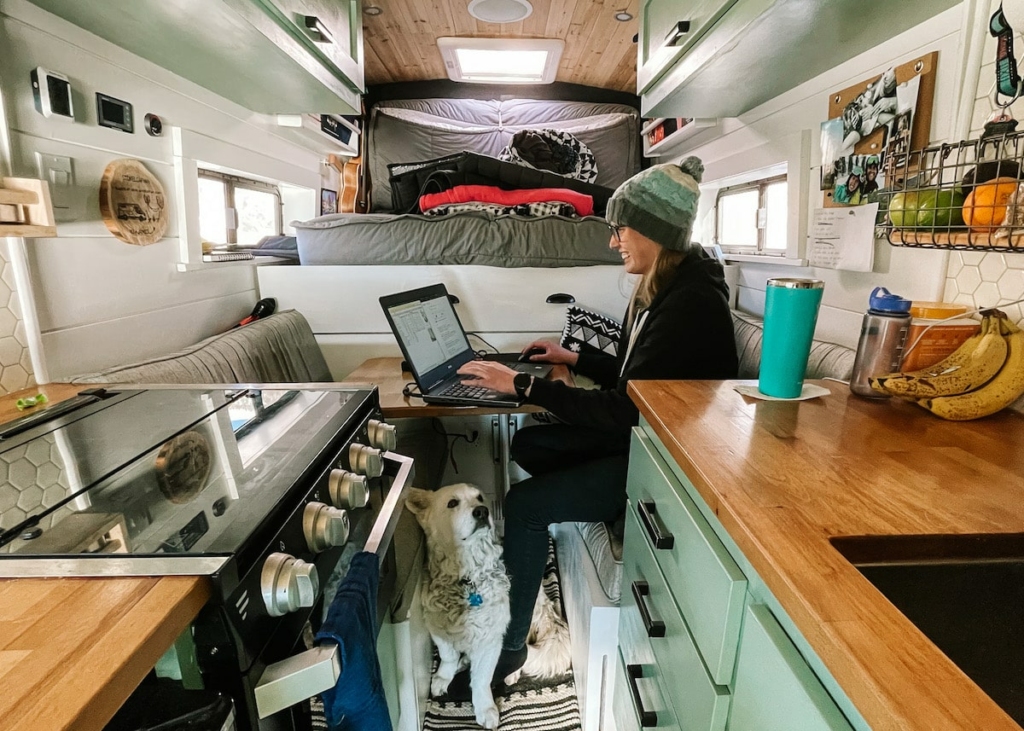
Hot days in general: It’s miserable for humans so it’s worse for dogs. We would move around to make sure we were in areas in the 80’s and below to keep us and our dog comfortable. We would try to do all of our chores or errands early in the day so the van was still nice and cool for the dog while we were gone.
Editor’s note: KJ and James use tools such as high-quality van insulation, a ceiling vent fan and blackout curtains to help regulate the temperature in their camper van. Read their full tutorial on how to prep your van to handle hot weather with a dog.
Storage space: having a place for their dog food, dog bowl, and gear (long leash, dog bags, dog bed, toys, etc.)
Logistics: If you want to go on a long hike or go to a National Park, you’ll have to plan your hikes/visit with your dog in mind. While most national parks allow dogs, some only allow them in certain areas–and some don’t allow them at all. Check out this NPS.gov map of which parks allow dogs.
Keeping the dog safe (and yourself safe): Always thinking about if your dog is OK in the van. Even when you know the interior van temp doesn’t exceed the hottest temp of the day, you still stress about if your dog is good and if anyone will try to break into your van to save your dog.
When traveling solo in the van as a woman, I would take out the dog for their potty break or evening walk before relocating to my sleep spot for the night. I didn’t want people to see I was by myself where I would park overnight.
Pet meds: When we traveled with our senior dog we were always seeing what vets were around just in case and we had to do pet meds with Walmart so we could get her monthly meds on the road. Getting pet meds was a giant pain in the butt because of needing vet approval from your home vet or needing to see a new vet to get a new script.
What (if any) type of training have you done to help your dog adjust to being in a van?
We have not done any dog training with a professional trainer (yet) but we have been doing loads of training with our pup since the beginning. Training is a daily exercise not just once a week! We worked in small shorter sessions a few times a day when he was really young. Now we mix it in throughout the day and on walks. Here are what we find to be the most important things to properly train your dog for:
Noise training. There are so many new and weird sounds dogs will hear when living in a van. It’s important to try to desensitize them. Hoagie was scared of the sound of loud trucks, air brakes, rattly exhaust and skateboard wheels and so we worked on sounds like that by taking him to areas where he might hear those things, but from further away, so that if we slept at a truck stop he wouldn’t be scared.
Exposure to other dogs and people. We worked on letting him socialize with both big and little dogs, and humans (from small kids to elderly). It is important to note that most dogs shouldn’t socialize with dogs you don’t know or go to dog parks until around 16 weeks, after they have had all of their puppy shots (to prevent Parvo).
A strong stay command is so valuable. This will allow you to open the doors and not have your dog jump out of the van – super important in case you are sleeping on a busy road or if you open the door and someone or a dog happens to be walking by at the same time.
Recall. We’re still working on this one. But a strong recall is extremely important. You may need to call your dog back from a harmful scenario or keep them back from interacting with someone or a pet who doesn’t want to meet your dog. If you do not have a very strong recall, it is not time to be off leash in a large social setting such as public dog parks.
Separation anxiety. If you get a puppy while you are living in a van, you may want to work on separation, too. Because of the very close proximity and being together 24/7 in a van, your dog could become dependent on you and develop separation anxiety. I don’t know what to recommend here but just something to keep in mind.
We took Hoagie on a few short trips to get him used to being in the van (since we did not live full time in it when we got him). We wanted to prioritize that car rides were positive experiences for him (we previously had a dog that got very carsick/anxious in cars).
Is your dog's behavior different between being in the van vs in a house?
Slightly, but nothing dramatic. The biggest thing we notice in the van is that he is absolutely exhausted at the end of the day. I think because he is taking in so many new smells and sights and other sensory things each day.
How has your routine changed going from senior dog life, to no dog, to puppy van life?
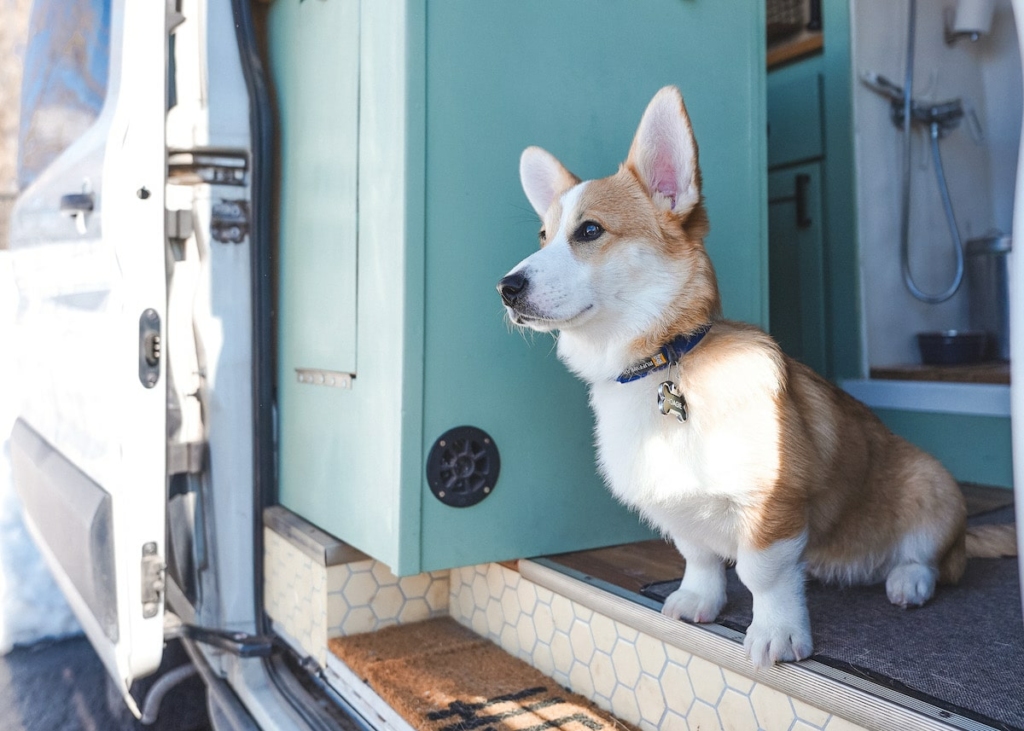
Without a dog, we were less concerned about the immediate area around our van when we parked for the night. Normally we would look for a spot with at least a patch of grass and a street light pole for our dog to stretch and do his business (if we were camping in the city).
When we had our senior dog, she was less picky but we always planned to have a park within a few miles drive to take her to in the morning.
When traveling with a dog, we are WAY more conscious of how long we are away from the camper van – this goes for hiking or working in a coffee shop. Even though we know the dog is fine and the temperature in the van is regulated, we still want to check in and make sure they’re OK.
Our senior dog would not get in the cab, but our puppy likes to climb into the front driver or passenger seat. This poses a problem because people walking by may see Hoagie and try to break in and save him. So, we put up all the front cab window covers or block the isle to prevent this from happening.
Has your dog met other pets on the road? If so, how do you handle it?
Yes! He has done really well thankfully! We have taken him to some larger van life meetups and he has had some more low key interactions as well.
Lucky was good and tolerant of other dogs but wasn’t playful due to her age. The biggest issue we had with her at meetups was when other off-leash dogs would run up to her near the van, which scared her.
Do you have to split up dog duties? If so, any tips on how to best do it?
It’s pretty even, but I will say James does take Hoagie, and our past dogs, out for their night and morning potty more often. This likely started as a subconscious effort to not have someone think there was a solo woman in the van.
What are the extra perks of van life with a dog?

Love, entertainment, watching them interact with the world, taking them on hikes, and getting to spend 24/7 with them. It really made me realize how much time I didn’t spend with my dog when I was going into an office everyday and spending 9-11 hours away from them. Also what mood lifters they are!
Any other bits of wisdom about van life with a dog?
GET PET INSURANCE. If you can afford it, work it into your van life budget. If you pick the right brand with the right coverage it will save you in the long run.
We didn’t have it with our previous 2 dogs and we could kick ourselves. We currently have insurance through Lemonade and it has been fantastic.
Editor’s note: it’s recommended to keep a copy of your dog’s vaccination records on-hand.
Also, the biggest thing to consider is the first 2 months of owning a brand new puppy. You’ll need to get shots in regular intervals of 3ish weeks. If you don’t want to pay a Vet fee (to see the new vet) each time, go back to the same office or go to a chain like Banfield. Also this is when the puppy is most susceptible to Parvo, so avoid dog parks and try to stay away from heavily dog-trafficked public areas.
Dog-Friendly Venues & Recreation Areas
As more and more people adopt dogs into their families, more and more dog-friendly venues are popping up around the US. If you van life with a dog, you can opt to visit these places so both you and your dog can enjoy yourselves:
National forests (these are great; free camping, hundreds of acres of beautiful and quiet land, and all the room for your dog to run around)
(Most) national parks (these are typically more limiting for dogs than national forests and have restricted areas)
So, is your puppo ready to become a van life dog? No question that both you and your dog will face new challenges, but that’s half the adventure. Share the joy of living van life with a dog and you’ll definitely make their days a lot more exciting than sitting at home alone.
